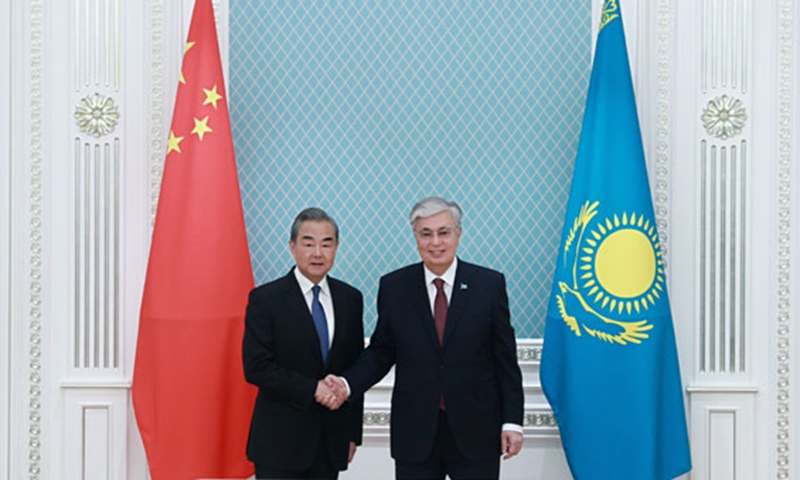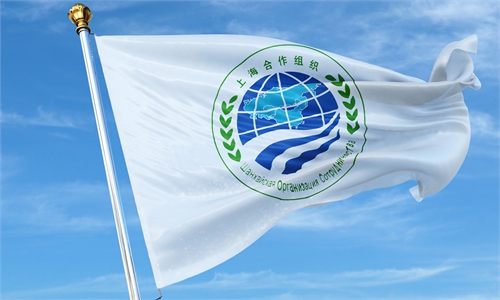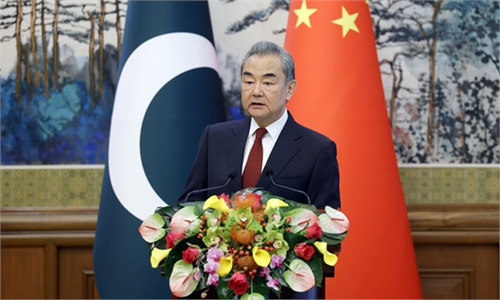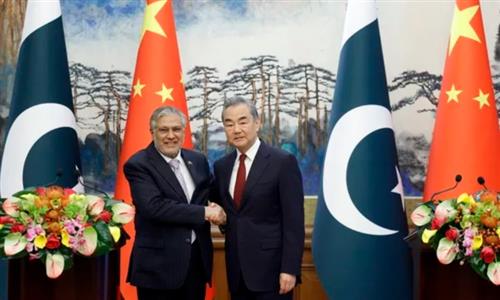FM’s Kazakhstan visit to ‘bring new momentum to cooperation’
Central Asia plays increasingly important role in SCO: analyst

Wang Yi, a member of the Political Bureau of the Communist Party of China Central Committee and Minister of Foreign Affairs meets with Kazakh President Kassym-Jomart Tokayev in Astana on May 20, 2024. Photo: Chinese Foreign Ministry
Wang Yi, a member of the Political Bureau of the Communist Party of China Central Committee and Minister of Foreign Affairs, started his official visit to Kazakhstan on Monday, where he and his counterpart touched on broader cooperation in fields such as introducing electric vehicle manufacturers from China to the central Asian country. Wang is also expected to attend a meeting of the Council of Foreign Ministers of the Shanghai Cooperation Organization (SCO) in Astana on Tuesday.While meeting Wang on Monday, Kazakh President Kassym-Jomart Tokayev pointed out exceptionally important role of China's diplomacy in global policy. According to him, China's initiatives form the global agenda and make a huge contribution to maintaining the international peace and stability.
Kazakhstan firmly adheres to the one-China principle, and this stance will never change, as no country should be divided, according to media reports.
Kazakhstan reaffirmed its adherence to the one-China principle, recognizing that Taiwan is an inalienable part of China's territory, read a press release of Chinese foreign ministry after Wang's meeting with Deputy Prime Minister and Minister of Foreign Affairs Murat Nurtleu on Monday in Astana.
China and Kazakhstan continue to deepen mutual political trust, supporting each other on issues concerning their core interests and providing strong assistance when one side encounters difficulties. China and Kazakhstan have long been a de facto community with a shared future, according to the release.
After Monday's talks with Wang, Nurtleu said Kazakhstan supports China manufacturing electric vehicles in the country and also invites Chinese companies to jointly develop rare-earth minerals. The two sides are also open to cooperation in the fields of digital technologies and AI, the news agency reported.
Nurtleu said that the agreement to form an innovations and agriculture subcommittee between Kazakhstan and China will lay the foundation for further business support in the development of mutually beneficial projects in the sphere of agricultural products production and processing, media reported.
Cooperation between China and Kazakhstan has been advancing rapidly, according to experts.
The meeting on Monday is expected to bring new momentum to bilateral cooperation, Cui Heng, a scholar from the Shanghai-based China National Institute for SCO International Exchange and Judicial Cooperation, told the Global Times on Monday.
Cui noted that if electric vehicles are manufactured in Kazakhstan, exports to Russia, Belarus, and other members of the Eurasian Economic Union (EEC) can benefit from favorable tax policies.
This will help expand the market for China's electric vehicles and Kazakhstan will also reap the rewards of the increasing popularity of electric vehicles from China.
Wang's visit is expected to bring discussions on the Trans-Caspian International Transport Route (TITR), known as the "Middle Corridor," further, Cui said.
Middle Corridor is a key transportation artery that connects the robust economies of China and Europe, which Kazakhstan hopes to get connected to through the central part of the Eurasian continent, experts explained.
During Wang's visit, he also engaged with foreign ministers of other SCO member states and is set to coordinate and prepare for this year's meeting of the Council of Heads of State of SCO, exerts also said.
For the SCO, central Asian countries including Kazakhstan are playing an increasingly important role of driving the initiatives within the organization, especially after several rounds of expansion. Kazakhstan has also been engaging in SCO summit preparations in both bilateral agreements and also in multilateral levels, experts said.
Belarus plans to become a full member of the SCO in July and Saudi Arabia's cabinet also approved a decision to join the SCO last year, media reports said.
Wang Yi also held a meeting with Russian Foreign Minister Sergey Lavrov in Astana on Monday, during which Wang underscored that in the current situation, a closely united and cooperative SCO that eyes win-win outcomes not only aligns with the common interests of all member states but also conforms to the trend of world multipolarity.
China is willing to work closely with Russia and other member states to steer the SCO in the right direction, jointly safeguard regional security, stability, and development, and promote global governance towards a more just and reasonable direction, Wang stressed.
The current international and regional landscape, the prospects of the SCO's growth, cooperation in various fields and other issues of mutual interest, and making full preparations for this year's meeting of the SCO Council of Heads of State are among the topics of discussion, according to Chinese foreign ministry spokesperson Wang Wenbin at a regular press briefing on May 16.
Against the backdrop of a current anti-globalization trend, coupled with the rise of global far-right movements, the SCO plays a significant role in maintaining regional security governance. Especially amid the conflict between Russia and Ukraine, dealing with terrorism and ensuring political security both bring challenges, Cui noted.
Zhu Yongbiao, the director of the Center for Afghanistan Studies at Lanzhou University, believes the SCO will continue to enhance collaboration this year with various international bodies, introducing fresh perspectives and innovative resolutions to global governance, and contributing its efforts in shaping the multipolar global order.
Prior to the visit to Kazakhstan, Wang wrapped up his visit to Tajikistan where he had friendly in-depth exchanges with his Tajik counterpart Sirojiddin Muhriddin and reached important consensus with him.
Within the SCO framework, Wang said China supports the establishment of an SCO anti-drug center in Dushanbe, and encourages Tajikistan to bolster coordination with China within multilateral frameworks including the United Nations and the SCO.



